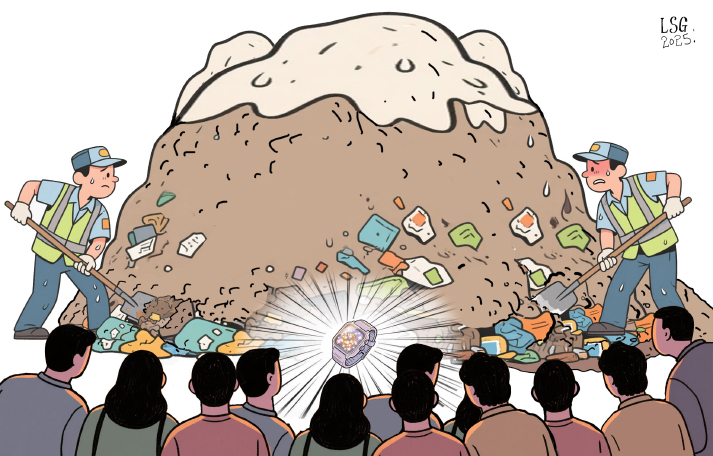| China |
| Lost watch, found controversy: Was this 'rescue mission' worth it? | |
|
|
 LI SHIGONG
In Datong, a historic city in Shanxi Province, a child's lost watch set off an unexpected chain of events. The timepiece was accidentally tossed into a trash bag and left behind on a train. The next morning, a distressed tourist called the city's hotline for help—prompting a swift response from the Datong Urban Management Bureau. Two sanitation workers then spent four grueling hours combing through 8 tons of garbage before finally recovering the watch. The incident quickly went viral, sparking fierce online debate. Many netizens praised the city's efficiency and the sanitation workers' dedication, while others questioned whether such an effort was a misuse of public resources. In response, the bureau clarified that it "didn't weigh whether it was 'worth it'"—it simply helped an ordinary visitor. Li Zhiyao (People's Daily): The city assisting the tourist, the tourist expressing gratitude and netizens speaking out for the sanitation workers all reflect acts of kindness. All these demonstrate goodwill and positive intentions. A city's services to tourists inherently include providing prompt assistance to those in need. The manner of assistance should be carefully evaluated on a case-by-case basis, considering the necessary personnel and resources to be deployed, with the aim of avoiding or minimizing disruptions to the city's day-to-day functioning, residents' lives and regular work. If the assistance process is time-consuming and labor-intensive, requiring substantial effort from those helping, thorough consideration should be given to appropriately compensating the labors involved. It is encouraging that the Datong sanitation company employing them will recognize these two workers with rewards and a fund will be created using a portion of its budget as a sustained motivation for altruism. Yang Xinyi (China Youth Daily): The scarcity of public resources makes efficient and equitable allocation paramount. The cost in this child watch case, which encompassed arduous labor, the movement of 8 tons of waste and four hours of time, to recover a non-essential and easily replaceable item (as opposed to a critical item like a cochlear implant), begs the question: Was this a worthwhile use of resources? Could those resources have been more effectively channeled to fulfill more critical public needs? This assessment is not intended as indifference, but rather as a consideration of how public funds should be efficiently disbursed. The sustainability of such help makes this question unavoidable. Lost property incidents are not unique occurrences, and consistently responding with such intensive and costly measures is unsustainable. It's thus essential to develop a system for cost disclosure and shared responsibility. When search expenses substantially outweigh the standard value of the item and the matter is non-urgent, public service departments should implement a transparent cost disclosure policy. After comprehensive consultation, the person requesting assistance can voluntarily opt to cover a portion of the justifiable expenses. This doesn't mean turning public services into a commercial business; instead, it aims to encourage public awareness of resource limitations and foster the responsible use of public services. BR Copyedited by Elsbeth van Paridon Comments to yanwei@cicgamericas.com |
|
||||||||||||||||||||||||||||||
|